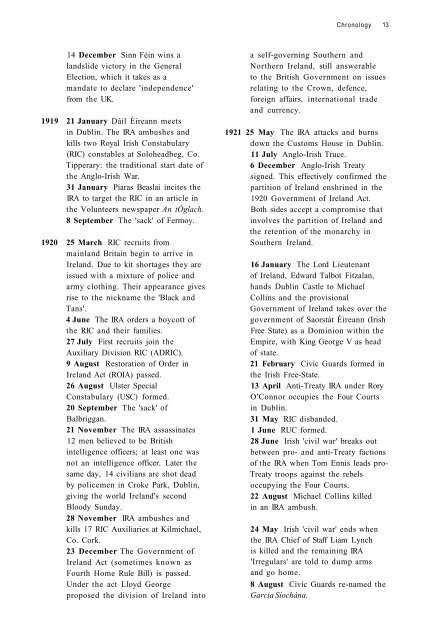Create successful ePaper yourself
Turn your PDF publications into a flip-book with our unique Google optimized e-Paper software.
Chronology 13<br />
14 December Sinn Féin wins a<br />
landslide victory in the General<br />
Election, which it takes as a<br />
mandate to declare 'independence'<br />
from the UK.<br />
1919 21 January Dáil Éireann meets<br />
in Dublin. <strong>The</strong> IRA ambushes and<br />
kills two Royal <strong>Irish</strong> Constabulary<br />
(RIC) constables at Soloheadbeg, Co.<br />
Tipperary: the traditional start date of<br />
the <strong>Anglo</strong>-<strong>Irish</strong> <strong>War</strong>.<br />
31 January Piaras Beaslai incites the<br />
IRA to target the RIC in an article in<br />
the Volunteers newspaper An tÓglach.<br />
8 September <strong>The</strong> 'sack' of Fermoy.<br />
1920 25 March RIC recruits from<br />
mainland Britain begin to arrive in<br />
Ireland. Due to kit shortages they are<br />
issued with a mixture of police and<br />
army clothing. <strong>The</strong>ir appearance gives<br />
rise to the nickname the 'Black and<br />
Tans'.<br />
4 June <strong>The</strong> IRA orders a boycott of<br />
the RIC and their families.<br />
27 July First recruits join the<br />
Auxiliary Division RIC (ADRIC).<br />
9 August Restoration of Order in<br />
Ireland Act (ROIA) passed.<br />
26 August Ulster Special<br />
Constabulary (USC) formed.<br />
20 September <strong>The</strong> 'sack' of<br />
Balbriggan.<br />
21 November <strong>The</strong> IRA assassinates<br />
12 men believed to be British<br />
intelligence officers; at least one was<br />
not an intelligence officer. Later the<br />
same day, 14 civilians are shot dead<br />
by policemen in Croke Park, Dublin,<br />
giving the world Ireland's second<br />
Bloody Sunday.<br />
28 November IRA ambushes and<br />
kills 17 RIC Auxiliaries at Kilmichael,<br />
Co. Cork.<br />
23 December <strong>The</strong> Government of<br />
Ireland Act (sometimes known as<br />
Fourth Home Rule Bill) is passed.<br />
Under the act Lloyd George<br />
proposed the division of Ireland into<br />
a self-governing Southern and<br />
Northern Ireland, still answerable<br />
to the British Government on issues<br />
relating to the Crown, defence,<br />
foreign affairs, international trade<br />
and currency.<br />
1921 25 May <strong>The</strong> IRA attacks and burns<br />
down the Customs House in Dublin.<br />
11 July <strong>Anglo</strong>-<strong>Irish</strong> Truce.<br />
6 December <strong>Anglo</strong>-<strong>Irish</strong> Treaty<br />
signed. This effectively confirmed the<br />
partition of Ireland enshrined in the<br />
1920 Government of Ireland Act.<br />
Both sides accept a compromise that<br />
involves the partition of Ireland and<br />
the retention of the monarchy in<br />
Southern Ireland.<br />
16 January <strong>The</strong> Lord Lieutenant<br />
of Ireland, Edward Talbot Fitzalan,<br />
hands Dublin Castle to Michael<br />
Collins and the provisional<br />
Government of Ireland takes over the<br />
government of Saorstát Éireann (<strong>Irish</strong><br />
Free State) as a Dominion within the<br />
Empire, with King George V as head<br />
of state.<br />
21 February Civic Guards formed in<br />
the <strong>Irish</strong> Free-State.<br />
13 April Anti-Treaty IRA under Rory<br />
O'Connor occupies the Four Courts<br />
in Dublin.<br />
31 May RIC disbanded.<br />
1 June RUC formed.<br />
28 June <strong>Irish</strong> 'civil war' breaks out<br />
between pro- and anti-Treaty factions<br />
of the IRA when Tom Ennis leads pro-<br />
Treaty troops against the rebels<br />
occupying the Four Courts.<br />
22 August Michael Collins killed<br />
in an IRA ambush.<br />
24 May <strong>Irish</strong> 'civil war' ends when<br />
the IRA Chief of Staff Liam Lynch<br />
is killed and the remaining IRA<br />
'Irregulars' are told to dump arms<br />
and go home.<br />
8 August Civic Guards re-named the<br />
Garcia Síochána.



